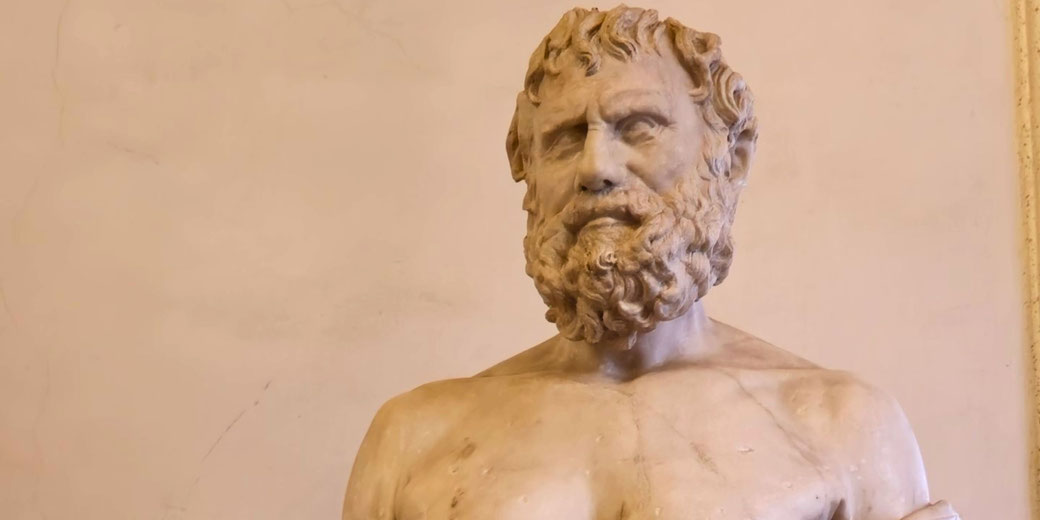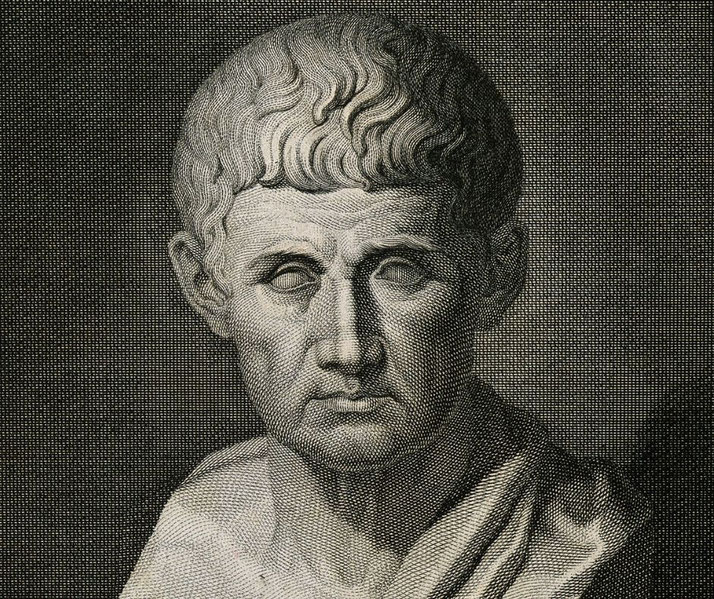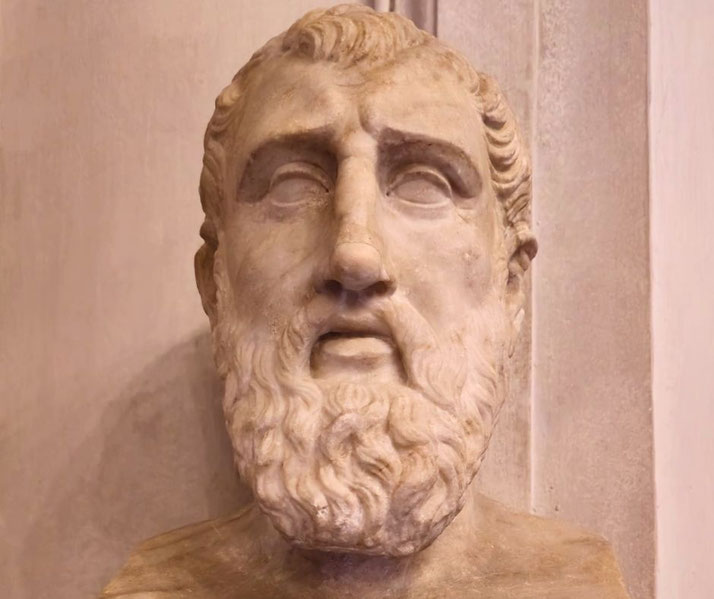The 10 greatest philosophers from Ancient Greece and their revolutionary ideas

In the cradle of Western civilization, beneath the shadow of the Parthenon and the echoes of epic poetry, a group of extraordinary thinkers emerged, forever changing the course of human thought.
These were the philosophers of Ancient Greece, intellectual titans who dared to question the world around them, laying the foundations for much of our modern philosophy, science, and politics.
From the probing inquiries of Socrates to the comprehensive systems of Aristotle, their ideas have reverberated through the ages, shaping societies and sparking endless debates.
But who were these men, really?
What drove them to such profound contemplations?
And how did their philosophies challenge the status quo of their time?
1. Socrates
Socrates, often hailed as the father of Western philosophy, was a figure of monumental significance in the development of philosophical thought.
Born in Athens in 469 BC, he spent most of his life engaging citizens of all backgrounds in philosophical discussions.
Unlike many of his contemporaries, Socrates left no written records of his thoughts.
Instead, our understanding of his philosophy comes primarily from the accounts of his students, most notably Plato.
Socrates is perhaps best known for his method of inquiry, known as the Socratic method.
This technique involves asking a series of probing questions to expose contradictions in someone's beliefs, encouraging them to question their assumptions and arrive at their own conclusions.
This method was revolutionary, as it shifted the focus of philosophy from the natural world to human nature, ethics, and morality.
Socrates' philosophical inquiries often challenged the conventional wisdom of Athens, leading to his trial and execution in 399 BC.
Accused of corrupting the youth and impiety against the pantheon of Athens, he was sentenced to death by drinking a cup of poison hemlock.
His death, however, only amplified his influence. His life and teachings became the subject of numerous dialogues written by his student Plato, which have since become foundational texts in Western philosophy.

2. Plato
Plato, born in Athens around 428 BC, was a pivotal figure in the history of philosophy.
As a student of Socrates, he was deeply influenced by his teacher's ideas and methods, which he further developed and refined in his own philosophical system.
Unlike Socrates, Plato left a substantial body of written work, providing us with a rich and detailed understanding of his philosophical views.
Plato's philosophy is often characterized by his theory of Forms, which posits that the physical world is not the real world; instead, ultimate reality exists beyond our sensory experiences.
According to Plato, the Forms are perfect, eternal, and unchangeable, and physical objects are merely imperfect copies of these ideal Forms.
This theory has had a profound influence on metaphysics and epistemology, the branches of philosophy concerned with the nature of reality and knowledge.
In addition to his metaphysical ideas, Plato made significant contributions to ethics, political philosophy, and the philosophy of education.
His work "The Republic" is a detailed exploration of justice and the ideal state, proposing a society ruled by philosopher-kings, individuals who have achieved a deep understanding of the Forms and thus are best equipped to govern.
Plato's influence extended beyond his philosophical ideas. He founded the Academy in Athens, the first institution of higher learning in the Western world.
The Academy attracted students from across the Greek world and served as a model for future educational institutions.
3. Aristotle
Aristotle, born in 384 BC in the city of Stagira in northern Greece, was one of the most influential philosophers in history.
A student of Plato's Academy, Aristotle would go on to tutor Alexander the Great and establish his own school, the Lyceum, in Athens.
Unlike his predecessors, Aristotle's philosophical inquiries spanned a vast range of subjects, making him a truly universal thinker.
Aristotle's philosophy is characterized by his empirical approach, a stark contrast to Plato's idealistic philosophy.
Aristotle believed that our understanding of the world should be based on observation and experience rather than abstract reasoning.
This empirical approach laid the groundwork for the scientific method and has had a profound influence on the development of science.
In metaphysics, Aristotle rejected Plato's theory of Forms, proposing instead that form and matter are inseparable.
He introduced the concept of "substance," the combination of form and matter, as the fundamental entity of reality.
Aristotle's metaphysical ideas have had a lasting impact on philosophical thought and continue to be a subject of debate and study.
Aristotle's contributions to ethics, particularly his concept of virtue ethics, are also significant.
In his work "Nicomachean Ethics," Aristotle argues that moral virtue is a mean between extremes and that the virtuous life is one of moderation.
He also introduced the concept of eudaimonia, often translated as "flourishing" or "the good life," as the ultimate goal of human life.
In the realm of political philosophy, Aristotle's "Politics" provides a detailed analysis of different types of government and explores the relationship between ethics and politics.
His political and ethical theories have influenced a wide range of philosophers and political theorists, from the ancient Romans to modern thinkers.

4. Pythagoras
Pythagoras, born around 570 BC on the island of Samos, was a philosopher and mathematician whose influence extends far beyond the realm of ancient Greece.
While he is perhaps best known for the Pythagorean theorem in mathematics, his contributions to philosophy and religious teaching were equally significant.
Pythagoras is often credited with the belief that numbers constitute the true nature of things, a philosophy now known as Pythagoreanism.
This belief extended beyond the abstract and into the tangible world, with Pythagoras and his followers attributing specific characteristics and qualities to numbers.
For instance, they considered odd numbers masculine and even numbers feminine. This numerical philosophy laid the groundwork for a belief system that viewed the universe as an orderly, harmonious system governed by numbers.
In addition to his numerical philosophy, Pythagoras is also known for his teachings on the transmigration of souls, or metempsychosis.
He believed in the immortality of the soul and its reincarnation into new bodies after death.
This belief was part of a broader ethical system that encouraged purity and asceticism, with the ultimate goal of liberating the soul from the cycle of rebirth.
Despite his significant influence, much of what we know about Pythagoras comes from later sources, and his teachings were often conflated with those of his followers.
The Pythagoreans, as they were known, formed a religious and philosophical school that continued to develop and expand upon Pythagoras's ideas long after his death.
5. Heraclitus
Heraclitus, born around 535 BC in the city of Ephesus in what is now Turkey, was a pre-Socratic philosopher known for his cryptic and enigmatic sayings.
Often referred to as "The Obscure," Heraclitus's philosophical ideas were revolutionary for his time and continue to be influential in the field of philosophy.
One of Heraclitus's most famous doctrines is the idea of constant change, encapsulated in his statement, "No man ever steps in the same river twice."
According to Heraclitus, the world is characterized by a constant process of becoming and passing away, with everything in a state of flux.
This concept of perpetual change challenged the static worldview of many of his contemporaries and has had a lasting impact on philosophical thought.
Heraclitus also introduced the concept of Logos, a term that is notoriously difficult to translate but is often rendered as "reason," "word," or "order."
Heraclitus saw the Logos as an underlying principle that governs the universe, a kind of cosmic law that guides the process of change and ensures the world's coherence and stability.
This concept of Logos would later play a significant role in Stoic philosophy and early Christian thought.

6. Democritus
Democritus, born around 460 BC in Abdera, Thrace, was a pre-Socratic philosopher known for his pioneering ideas in atomic theory.
Often referred to as the 'father of modern science,' Democritus's philosophical ideas laid the groundwork for our modern understanding of the physical world.
Democritus, along with his teacher Leucippus, proposed that the universe is composed of tiny, indivisible particles called atoms, moving in a void.
According to Democritus, these atoms, which are eternal and unchangeable, combine in different ways to form the various objects and substances we see in the world.
This atomic theory was revolutionary for its time and marked a significant departure from the philosophical ideas of his contemporaries, who typically believed in the four classical elements of earth, air, fire, and water.
In addition to his atomic theory, Democritus also made significant contributions to ethics.
He believed that the goal of life was to achieve a tranquil mind, a state he referred to as "cheerfulness" or "euthymia."
According to Democritus, this state could be achieved through moderation, self-control, and the pursuit of knowledge.
Despite the groundbreaking nature of his ideas, Democritus's atomic theory was largely ignored or rejected by the philosophers of his time, including Plato and Aristotle.
It wasn't until the 17th century, with the advent of modern science, that his ideas were rediscovered and recognized for their insight.
7. Epicurus
Epicurus, born in 341 BC on the Aegean island of Samos, was an ancient Greek philosopher who founded a school of philosophy now known as Epicureanism.
His teachings, centered around the pursuit of pleasure and the avoidance of pain, have had a significant impact on Western philosophical thought.
Epicurus proposed a philosophy of simple pleasure, advocating for a life of moderate enjoyment free from pain, fear, and the pursuit of luxury.
He argued that the highest form of pleasure is the absence of pain, both physical and mental.
This concept, known as ataraxia, or tranquility, is achieved through the removal of unnecessary desires and the cultivation of friendships, freedom, and an analyzed life.
In addition to his ethical teachings, Epicurus also made significant contributions to the fields of physics, epistemology, and theology.
He adopted and modified Democritus's atomic theory, using it to argue against the fear of death.
According to Epicurus, death is simply the dispersion of our atoms and should therefore not be feared.
Epicurus's teachings were recorded in over 300 works, but unfortunately, only a fraction of these writings have survived.
Much of what we know about Epicureanism comes from later sources, particularly the Roman poet Lucretius's epic poem "On the Nature of Things."
8. Zeno of Elea
Zeno of Elea, born around 490 BC in southern Italy, was a pre-Socratic philosopher known for his perplexing paradoxes.
A student of Parmenides, another significant pre-Socratic philosopher, Zeno is most famous for his arguments against the concept of motion, which have puzzled and intrigued philosophers and mathematicians for over two millennia.
Zeno's paradoxes are a set of philosophical problems generally understood to be centered around the notions of motion and plurality.
The most famous of these is perhaps the paradox of Achilles and the Tortoise, in which Achilles, the great Greek hero of the Trojan War, gives a tortoise a head start in a race.
Zeno argues that Achilles will never overtake the tortoise because, for each distance Achilles covers, the tortoise also advances, creating an infinite number of smaller distances that Achilles must cover, and thus he can never surpass the tortoise.
These paradoxes were designed to support Parmenides's philosophical argument that contradicts the evidence of our senses, asserting that the belief in plurality and change is mistaken, and in particular that motion is nothing but an illusion.
While Zeno's paradoxes have been resolved with the development of calculus and more sophisticated concepts of infinity and limits in mathematics, they continue to stimulate philosophical discussion and have had a significant impact on the philosophy of space and time.

9. Diogenes of Sinope
Diogenes of Sinope, born around 404 BC, was a controversial figure and one of the most famous philosophers of the Cynic school.
Known for his eccentric behavior and provocative teachings, Diogenes challenged the social and cultural conventions of his time and advocated for a life of simplicity and self-sufficiency.
Diogenes is perhaps best known for his unconventional lifestyle. According to various accounts, he lived in a large ceramic jar in Athens and owned nothing but a cloak, a staff, and a bowl (which he discarded after seeing a child drink from his hands).
Diogenes's lifestyle was a radical embodiment of Cynic philosophy, which advocated for a return to nature and a rejection of artificial social conventions.
In addition to his lifestyle, Diogenes is also known for his sharp wit and provocative behavior.
One of the most famous anecdotes about Diogenes involves him carrying a lamp in broad daylight and claiming to be looking for an honest man.
This anecdote, like many others, illustrates Diogenes's disregard for social norms and his relentless pursuit of truth.
Despite his eccentricity, or perhaps because of it, Diogenes's philosophical ideas have had a significant influence on Western thought.
His emphasis on simplicity and self-sufficiency, as well as his critique of social conventions, have influenced a wide range of philosophical traditions, from Stoicism to existentialism.
10. Thales of Miletus
Thales of Miletus, born around 624 BC in the ancient city of Miletus in what is now Turkey, is often considered the first philosopher in the Greek tradition.
While little is known about his life, and none of his written works have survived, his influence on philosophy, science, and mathematics is undeniable.
Thales is best known for his belief that the underlying reality of the universe was water. This idea, while seemingly simple, was revolutionary for its time.
By suggesting a single material substance as the principle of all things, Thales moved away from mythological explanations of the world and towards a more rational, scientific approach.
This marks the beginning of natural philosophy, the precursor to modern science.
In addition to his philosophical ideas, Thales is also recognized for his contributions to mathematics and astronomy.
He is credited with defining basic geometric concepts and principles, such as the notion that a circle is bisected by its diameter.
He also reportedly predicted a solar eclipse in 585 BC, a significant achievement in the field of astronomy.
What do you need help with?
Download ready-to-use digital learning resources
Copyright © History Skills 2014-2025.
Contact via email
With the exception of links to external sites, some historical sources and extracts from specific publications, all content on this website is copyrighted by History Skills. This content may not be copied, republished or redistributed without written permission from the website creator. Please use the Contact page to obtain relevant permission.





